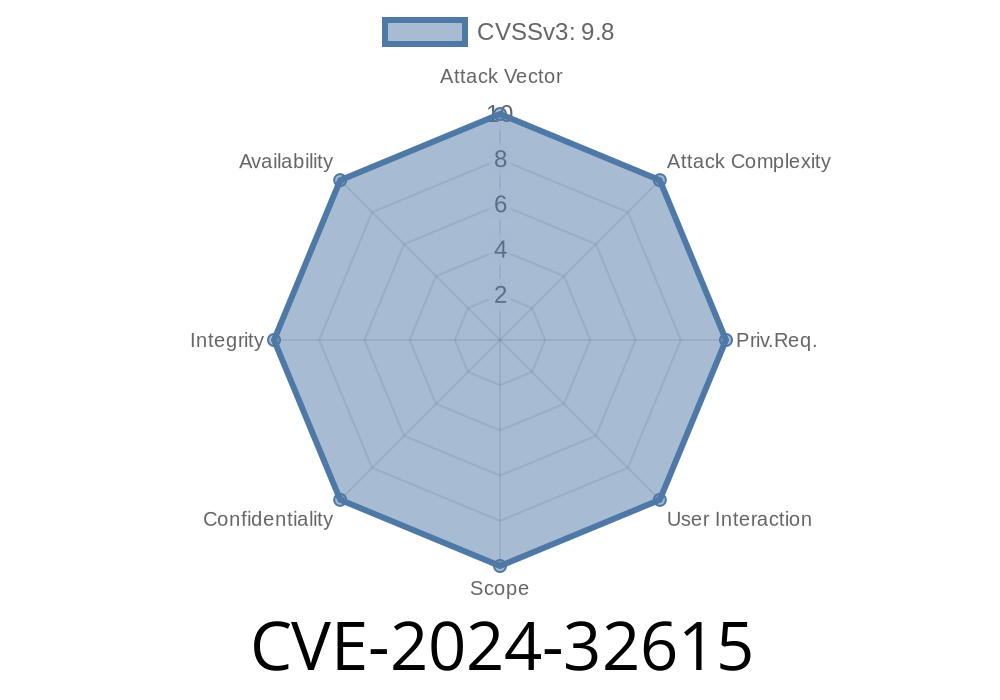A recently discovered vulnerability, CVE-2024-32615, shook confidence in the reliability of HDF5, one of the world’s most popular open file formats and libraries for handling large scientific data. If you use HDF5 in your projects or infrastructure, it is crucial to understand the problem, how it can be exploited, and what you can do to protect your data and systems.
This deep dive will explain the vulnerability in plain language, show what’s going wrong in the code, and demonstrate how an attacker might leverage this bug. We’ll wrap up with references and advice for staying safe.
What is CVE-2024-32615?
CVE-2024-32615 is a heap-based buffer overflow discovered in the HDF5 Library, up to version 1.14.3. The problem sits in the function H5Z__nbit_decompress_one_byte in the file H5Znbit.c. An earlier use of an improperly initialized pointer opens the door for writing data outside the bounds of allocated memory.
In simple terms: If HDF5 tries to read specially crafted data, a malicious file can overwrite memory it shouldn't, potentially allowing an attacker to run arbitrary code or crash processes.
Understanding the Technical Details
HDF5 is complex. At its core, it reads and writes scientific data, sometimes with various filters for compression/decompression. The n-bit filter is used for compressing data when you know the number of bits per value.
The vulnerable function tries to decompress data, byte by byte. If the code uses a pointer that hasn't been correctly checked or initialized, and then writes data using that pointer, bad things happen.
Here’s a simplified sample, inspired by the vulnerable code
herr_t H5Z__nbit_decompress_one_byte(
/* ... other params ... */
uint8_t *buffer,
/* ... other params ... */
)
{
uint8_t *dest_ptr = buffer;
/* Potentially unsafe use: dest_ptr might not point to a valid memory region. */
*dest_ptr = some_value; // <-- buffer overflow risk
/* ... */
}
A closer inspection of the real code shows that under certain conditions, dest_ptr could point outside the heap-allocated buffer, especially if data lengths or offsets are not validated properly.
Reference:
- HDF Group GitHub Commit (fix)
- NIST NVD entry
How Does an Attacker Exploit This?
Suppose a researcher or an automated script opens a hostile HDF5 file. If the file uses n-bit filter compression with maliciously crafted parameters (like a huge offset, or an illegal value), the function may write more data than it should—outside of the allocated memory buffer.
That’s heap-based buffer overflow: writing outside the intended area in heap memory.
Example: Exploit Scenario
Let’s walk through a simple (and fictionalized) example.
Writing to *dest_ptr corrupts memory.
- If an attacker carefully designs the file, they might overwrite function pointers or other heap metadata.
- If protections like ASLR, stack canaries, or DEP aren’t enough, attacker-controlled code may execute.
Sample pseudo-exploit (for educational purposes only)
# Malicious HDF5 file generator: sets up n-bit filter params to trick decompression
with open("evil.h5", "wb") as f:
f.write(craft_evil_hdf5_nbit_payload())
When opened in a vulnerable HDF5-reading program, the payload causes the overflow.
How Was It Fixed?
The HDF5 developers quickly patched the bug in commit #2625. The fix checks pointer values and validates lengths before copying or writing to memory.
If you use HDF5 version 1.14.3 or earlier, update now!
Treat data from untrusted sources as dangerous. Don’t open random .h5 files!
- Enable memory protection features: address sanitizers, system security modules, strong compiler flags.
References & Further Reading
- GitHub HDF5 fix pull request
- National Vulnerability Database: CVE-2024-32615
- HDF5 Documentation
Summary:
CVE-2024-32615 is a critical heap-based buffer overflow bug affecting HDF5 up to 1.14.3. Exploiting this bug is possible with malicious files. If you rely on HDF5 directly or indirectly, update your libraries and review security controls against file-based exploits.
Timeline
Published on: 05/14/2024 15:36:46 UTC
Last modified on: 07/03/2024 01:56:48 UTC
